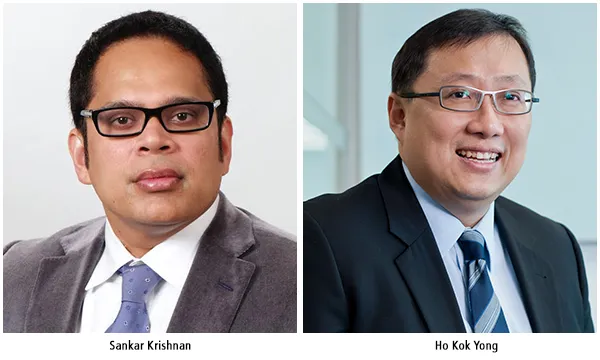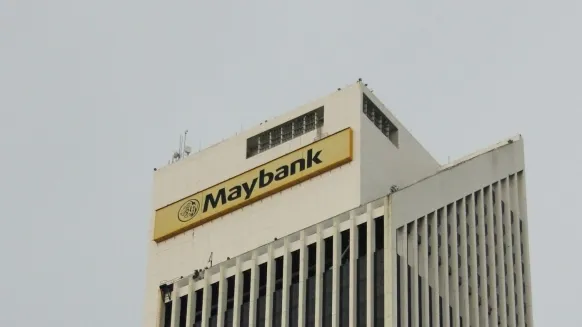
How compatible are blockchain and Asia's growing Islamic banking sector?
Lenders are adopting the technology in Shariah compliant smart contracts.
When UAE’s Emirates Islamic Bank introduced blockchain technology into its cheques as a fraud prevention measure in 2017, it signaled the start of a seamless convergence between the new technology and a fastgrowing sector that has an estimated $2t in Shariah compliant assets across about 60 countries. Analysts reckoned blockchain technology could further fuel the sector’s rapid transformation and expansion—some experts estimate it will add another $1t in assets by the end of 2018—although the lack of global standards remains a key hurdle.
The International Monetary Fund (IMF) executive board proposed to incorporate guidance from the Malaysia-based Islamic Financial Services Board into the Washington, D.C.-based lender’s assessments, which should improve regulation in this sector, said Sankar Krishnan, executive vice president, capital markets and banking at Capgemini. “This is very good as we will have more consistency in Shariah compliant products and just like we have generally accepted rules, we will have global Islamic finance rules which will augur well for even more Islamic financing.”
Islamic banking operates in accordance with the rules of the Shariah, or Islamic law, which pushes for finance based on sharing of profit and loss concept and forbids the payment of interest on debt.
Blockchain’s promise
Along with the growth of Islamic banking as a whole, analysts view blockchain technology as having potential in driving innovation in the sector similar to what is being seen in conventional banking. “Islamic banking is a leader with respect to fair and transparent enforceable contracts which is exactly what blockchain is striving to accomplish,” said Krishnan.
Krishnan reckoned Islamic banking will play a critical role in promoting one of the use cases of blockchain, which is delivering profitsharing agreements on the blockchain with a high degree of transparency. “How can we take smart contracts and make them Shariah compliant? I believe that Shariah law and blockchain have more convergence than divergence and we will see this come together in the next few years,” he said.
In fact, the convergence has already been started in late 2017 when the Islamic Research and Training Institute, a member of the Islamic Development Bank Group, partnered up with fintech firms Ateon and Settlemint in working on blockchainbased smart contracts to create Sharia-compliant financial products and automate the entire contractual process for Islamic institutions. Not only are these blockchain smart contracts easy to verify, immutable, and secure, but they also alleviate additional administrative and legal complexities and redundancies associated with Shariah compliant financial products.
Meanwhile, Emirates Islamic’s security enhancement feature, called Cheque Chain, involves the bank issuing new cheque books carrying a unique quick response (QR) code on every leaf along with 20 random characters. The next phase of the project will see the bank registering each cheque leaf on its blockchain platform to validatethe authenticity of the cheque at source.
“Blockchain has the potential to significantly increase security and protection in banking transactions and we are delighted to be amongst the first in the UAE to utilise this new technology,” said Emirates Islamic COO Suhail Bin Tarraf when the blockchain-powered measure was announced. “We anticipate that Cheque Chain will dramatically reduce cheque frauds in this market, helping us provide our customers greater peace of mind and security,” he added.
Concerns over IT systems have risen amongst Islamic banks to become the second most important in 2018, up from seventh and eighth in 2016 and 2015, respectively, according to the Global Islamic Bankers’ Survey 2018 by the General Council for Islamic Banks and Financial Institutions (CIBAFI). However, “it is unclear whether this represents a long-term strategic apprehension about the impact on business structures of new artificial intelligence, blockchain and cloud, or shorter-term concerns about cyber security and ageing systems,” the survey noted.
Other key opportunities
Outside of blockchain, fintechs can facilitate growth in Islamic banking, specifically in sukuk, mudarabah, wadiah, musharakah, murabahah, and takaful, added Krishnan. “There is no reason why we cannot have a digital bank committed to these forms of financing which have a great future. I will not be surprised if there is a digital-only Islamic bank that gets created which does significantly better than its traditional counterpart.”
Fintechs are also a good match for Islamic banks as they are always seeking to innovate and come up with new products and services in personal finance, wealth management, insurance and corporate financing, said Ho Kok Yong, Deloitte Southeast Asia financial services industry leader.
“Used properly, it can transform core banking systems by providing an agile platform to achieve corporate objectives,” said Ho, adding that Islamic banking and commercial banking might differ in many respects but they also share the same business, regulatory, and technology requirements; use similar customer channels; and functionally offer the same products.
As a sign of fintech’s growing significance amongst Islamic banks and their quest to secure key partnerships to advance in this area, over 40% of industry leaders think their institution has placed fintech and digital transformation at the forefront of their strategic planning decisions and deemed it ‘highly important’, CIBAFI’s survey found. It added that whilst cyber security, budget constraints, and lack of skilled staff have made Islamic banks wary of adopting new technologies, some Islamic financial institutions have indicated they were launching technology departments to cope with digital change, whilst others were forming joint ventures with fintechs, or buying them up.
In February, Bahrain’s Al Baraka Banking Group announced its partnership with Bahrain FinTech Bay, the largest fintech hub in the Middle East and North Africa region, and launched a digital Islamic bank in Germany in September. Meanwhile, Malaysia’s MBSB Bank Berhad announced in April that it will be focussing on developing its fintech capabilities to attract more customers.
Regulatory setbacks
However, when it comes to regulation and forming global standards, Islamic banking still has a long way to go relative to conventional banking. IMF directors have said that Islamic banks’ operations possess different risk profiles and balance sheet structures compared with conventional banks, which brings associated financial stability implications and prompted the call for stronger regulatory and supervisory frameworks. That said, the directors acknowledged that Islamic finance’s expansion “presents key opportunities to strengthen financial inclusion, deepen financial markets, and mobilise funding for development by offering new modes of finance and attracting ‘unbanked’ populations that have not participated in the financial system.”
Krishnan said there is a need to establish global standards and integrate them to digital banks and fintech startups, and noted that the regions of Asia and the Middle East and North Africa “have a big role to play” in this area. “We have to look at Shariah compliant assets as an ‘asset class’ and incorporate that asset class to every type of financing we do,” said Krishnan. “We should not move away from creating Shariah compliant regulators inside every central bank so that we can supervise this asset class and promote this asset class to interested parties,” he added.



















 Advertise
Advertise











